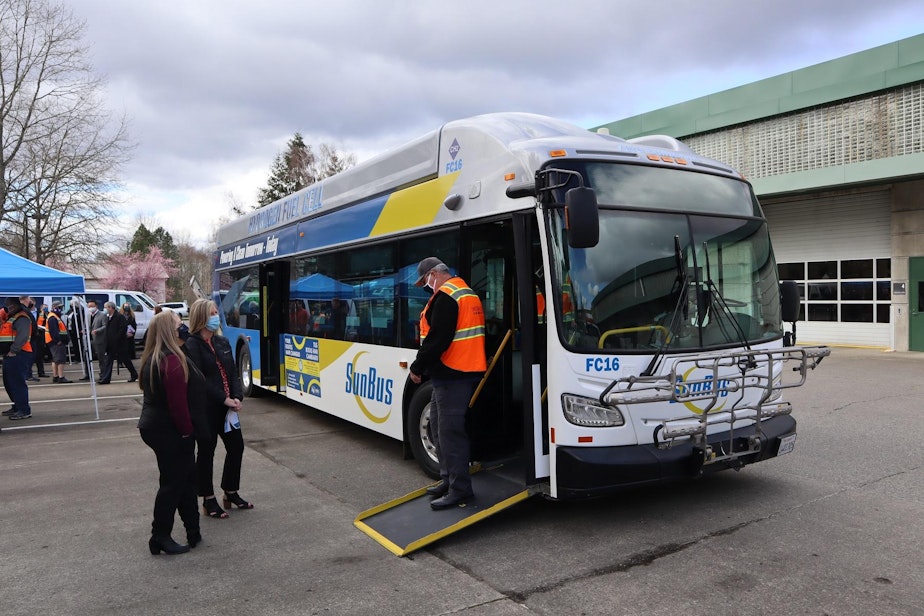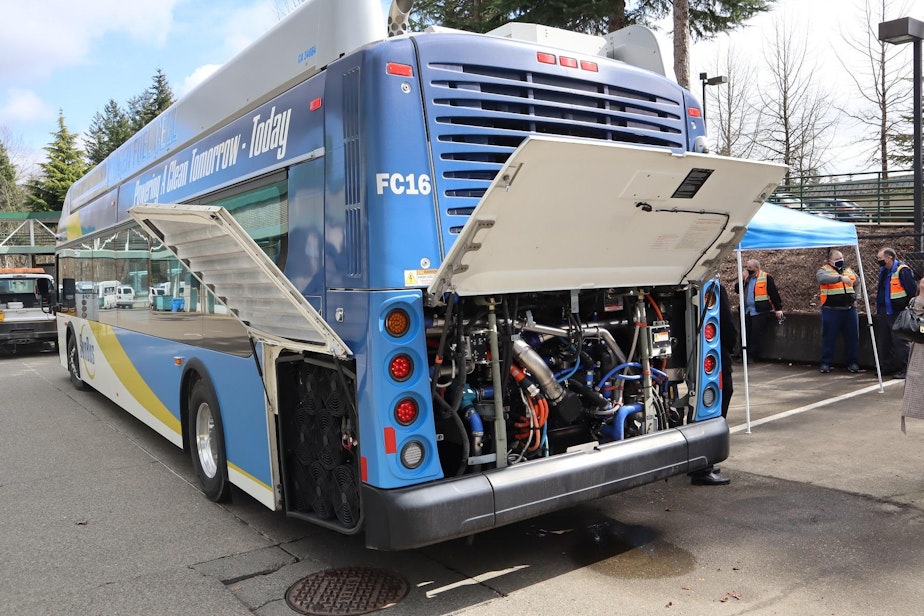Interest in hydrogen fuel growing in the Pacific Northwest — and tax dollars following

More folks from Pacific Northwest government and industry are jumping on the hydrogen bandwagon to test if the alternative fuel could be a viable and green replacement for diesel and gasoline, in some situations.
The potential converts include more than half a dozen transit agencies from Everett to Eugene, state legislators, and Boeing's drone subsidiary in the Columbia River Gorge.
A week-long demonstration tour with a hydrogen fuel cell electric bus drew interest from transit managers and drivers. It started at Kitsap Transit last Wednesday and is continuing down the Interstate 5 corridor with eight more stops at agencies large and small including Sound Transit, Pierce Transit, TriMet and Lane Transit District.
"We're studying all of these opportunities to try to determine what is the best path for our community here to a cleaner environment," Ann Freeman-Manzanares, general manager of Intercity Transit, said when the demonstration hydrogen bus stopped in Olympia Thursday.
A hydrogen fuel cell doesn't burn anything. It uses a chemical reaction between the hydrogen fuel and oxygen from the air to produce electricity to drive a motor. Fuel cell vehicle tailpipes emit only water vapor and warm air.
However, hydrogen fueling is comparatively more expensive than battery electric and diesel bus technology. The advantage is that a hydrogen fuel cell bus can operate much like current diesel buses can, but with zero emissions and without the range limitation and recharging downtime that current battery-powered buses have.
"I am really intrigued — still have lots to learn — but really intrigued by the idea of creating hydrogen on site by solar so it is a clean fuel source," Freeman-Manzanares said in an interview.
Sponsored
TriMet in Portland has committed to phasing in an all-alternative fuel bus fleet by 2040. So far, its evaluation of options is leaning toward battery electric propulsion. But hydrogen remains on the table for some routes.
"While this technology is not TriMet’s preferred approach at this time, the agency is looking into its long-term potential," said spokesperson Tia York in an email. "Part of the process includes seeking grant funding for acquisition of test vehicles and associated fueling equipment."
At Twin Transit in Chehalis, General Manager Joe Clark is awaiting delivery of two electric buses, which he hopes to compare in real world use to two hydrogen fuel cell buses and to conventional buses. Clark said Twin Transit has applied for federal funding to buy the hydrogen-powered models.
First hydrogen fueling station in NW coming to Chehalis
Clark said the stars were aligning to move in an eco-friendly direction because his home town is also set to host the Northwest's first commercial hydrogen fueling station. The Washington House of Representatives has tentatively included $2.5 million to pay for it in the new state construction spending budget.
Sponsored
That inaugural compressed hydrogen fill-up location, which may open in early 2022, could be joined by a second one along I-5 closer to Portland because the Bonneville Environmental Foundation last fall received private grant funding to build a demonstration station in southwest Washington.
The region's third hydrogen fueling station could be built in East Wenatchee after the state senator from that area recently added $1.5 million to the Washington Senate transportation budget to pay for it.
The state House and Senate still need to agree on finalized spending blueprints, but the current outlook excited one of the leading advocates for renewable hydrogen in Olympia.
"I'm starting to picture the corridors," said lobbyist Dave Warren, a consultant to the Douglas County Public Utility District. "It's heartening to see the progress with the sector growing so fast."
The fueling stations would receive their hydrogen supply from Douglas PUD, which broke ground earlier this month on a green hydrogen production facility near Wenatchee. The main feature of the plant will be an electrolyzer, which uses unsold electricity from the PUD's dam on the Columbia River to split water molecules into oxygen and hydrogen.

Hydrogen fueling still has plenty of skeptics. In an opinion column in The Guardian newspaper this month, British environmentalist Jonathan Porritt cautioned not to believe the "hydrogen hype."
"The gulf between [the] current reality, one rarely mentioned by hydrogen enthusiasts, and the prospect of readily available and affordable green hydrogen that could help us get to net zero, is absolutely vast," Porritt wrote.
Porritt said electric batteries make more sense to power vehicles, while adding that hydrogen may still have a good case for use in "hard-to-abate" sectors such as maritime shipping and steel and cement making.
Meanwhile, up in the air
Boeing's Columbia River Gorge-based subsidiary Insitu this month provided details about its testing of a hydrogen-powered variant of its popular ScanEagle reconnaissance drone.
Insitu said it was drawing interest from the defense sector because the fuel cell motor would be stealthier by virtue of being quieter and having a smaller heat signature than with current gasoline-powered engines.
A fuel cell-powered unmanned aircraft could represent "a significant game changer in the battlespace," said Insitu Pacific Managing Director Andrew Duggan in a media release.
"Operationally, fuel cell-powered platforms provide the potential for longer endurance missions, increased power availability for payloads, as well as significant reductions in noise signature," Duggan said.
An engineering department lab at Washington State University assisted Insitu with the development of the next generation liquid hydrogen fueling technology.
Sponsored
Copyright 2021 Northwest News Network




